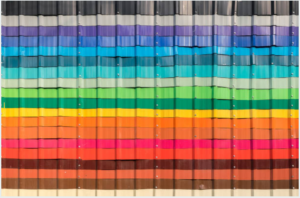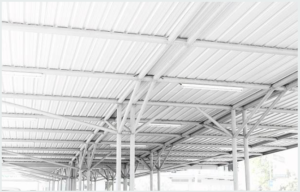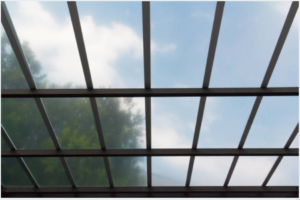Identify Gerard Quality/original Stone Coated Roofing Tiles In Nigeria
Genuine Gerard® roof tiles have the Gerard® logo printed on the back of the tile so that you can easily
identify the real thing. Check for this when buying, and also when the tiles are delivered to your site.Genuine Gerard® roof tiles are made to a certain standard in New Zealand by the very company that invented stone coated metal roofing tiles. Having over 60 years of heritage and experience has resulted in the optimum quality : cost ratio, and no other roof tile manufacturer can get anywhere close to that special formula. Instead, they produce roof tiles with cheaper and inferior raw materials that might look like Gerard® when new, but simply won’t last or perform like Gerard®. Unfortunately, by the time you are aware of this, it’s too late. The only remedy is to repair the roof with more tiles or replace it completely. Either way, the cost of doing this is more than choosing the right product for the job first time around!
There are a couple of phrases that you might know of…. “things are cheap for a reason” or “cheap is expensive” and “if something is too good to be true, it usually is,” and this last one in particular is important. With Genuine Gerard®, you have a product you can TRUST. You know where it comes from, and on our website you can see exactly how a Genuine Gerard® roof tile is made . We don’t hide anything because we believe in giving our customers all the information they need to make the right decision for them.
But how do you know what is Genuine Gerard® and what is fake? There are people who will tell you their tiles are Gerard® and there are two ways of knowing for sure. All Genuine Gerard® Roof tiles have the Gerard® logo printed on the back of the tile:
If that logo isn’t there, it’s not Genuine Gerard®. Secondly, in Nigeria Genuine Gerard® is only available through our exclusive Distributor
A stone coated metal roof is a roof made from steel or some other metal; the metal is then coated with stone chips and attached to the steel with an acrylic film. The goal is a more durable roof that still retains the aesthetic advantages of a more traditional.
1. Check the back of the roof tile to confirm whether the manufacturer's name, distributor's name and ISO number is fully inscribed at the back of the stone coated roofing tiles.If you can't find these information, it is an indication that the stone coated roofing tile is "fake/inferior" and it will surely fade off.
2. Ask the distributor to provide the manufacturer's contact.Failure to provide the manufacturer's contact, please don't patronize such company, it is an indication that they are selling "fake/inferior" stone coated roofing tiles.
3. The thickness must be 0.55mm
Who own Gerald Roofing : owned by the Koschitzky family
HOW TO SPOT A FAKE
To ensure that you are using genuine Tilcor tiles, there are signs to look for to tell the real thing from the fake.
1) Look at the back of the tile. A genuine Tilcor tile is printed with the Tilcor logo, batch number, date, and CE mark including words such as “Zincalume steel made by NZ Steel, Made in New Zealand.”


2) Check that the steel is coated with ZINCALUME®, which combines the corrosion protection of aluminium, with the sacrificial protection of zinc, providing the advantage of both metals.
As a result, ZINCALUME® has a significantly longer service life than a galvanised steel product that only uses zinc.
3) A genuine Tilcor product has 7 coating layers. Check this technical drawing of a genuine Tilcor tile to compare with your tile. If it doesn’t match you’ll know you’re dealing with a fake.

4) Check the stone granules. Natural New Zealand stone granules are the foundation for long term durability and stability for colour retention on Tilcor textured roofs. Ceramic coated natural stone granules offer brighter colours, and still provide outstanding weathering results, proven over the past 25 years. The Tilcor stone granules are bright in colour and come in a range of different shapes and sizes.
5) Further way to identify if it is a genuine Tilcor tile is through a couple of simple tests.
WET SCRAP TEST
You would use this test to prove the quality of the surface coating when it’s subjected to extreme rain and wet conditions.
METHOD
- Submerge your tile in water for 2 hours
- Take the tile out of the water and place on a bench
- Scrape the tile surface with a blunt screwdriver
- With a genuine tile this may result in a very slight loss of stone but not paint.

COLD BEND TEST
You would use this test to prove the quality of the surface coating when it’s subjected to extremely cold conditions.
METHOD
- Place the sample tile in a freezer overnight
- Remove the tile and bend it back on itself
- Rub the surface of the tile along the fresh bend
- With a genuine Tilcor tile the result can be a very slight loss of stone but certainly not a complete loss of stone or paint.
HOT SHEAR TEST
You would use this test to prove the quality of the surface coating when it’s subjected to extremely hot conditions.
METHOD
- Place the tile sample in an oven for an hour at approximately 70 – 80 degrees Celsius
- Then place the tile on a batten and twist the foot while applying slight pressure on the surface of the tile
- With a genuine Tilcor tile the result may be a very slight loss of stone but not a complete loss of stone or paint.
Roof sheeting has different variations that can match your needs and requirements. Each has its own pros and cons that you can take into consideration. Remember that roofs are a huge financial investment so it is better to be hands-on. Hence, it is a vital step to know what types of roofing sheets are available before you decide.
At Sterling Roofing Group, we commit to deliver the highest quality of service that you deserve. Since 1996, we have been around the industry providing superior roofing products and services to homeowners and commercial property owners. Because we value our clients, we give full attention down to the smallest details.
Today, let us talk about the different types of roofing sheets. Know what to expect and see what options you have.
1. Corrugated
From the word corrugated, this type of roofing sheet has repetitive folds. The corrugation that it forms intensifies the roof’s integrity. This option is for people looking for environmental-friendly materials.
This is widely used for various purposes due to its proven durability (as compared to its flat counterparts). It is ideal for garages, sheds, carports, porches, etc.
You can narrow down your choices under these categories by choosing which material and finish you would like to go for. We have highlighted four types of corrugated roofing sheets to expand your options:
Galvanized Steel Sheet
It is a carbon steel sheet coated with zinc produced through continuous hot dip process. This can be used either bare or painted. 
Polyester Painted Sheets
This is most commonly used for agricultural structures due to its medium-length lifespan. Although it is a cheaper option, it needs to be maintained every five or ten years. Installation and maintenance are crucial for it is prone to scratches.
PVC Plastisol
Plastisol is a steel sheet that treated with a primer paint. PVC is then rolled on top of it. Known for its durability, PVC plastisol coated sheets do not fade or scratch easily. It is expected to last up to 30 years. It is also weather-resistant and lightweight.
Bitumen
Corrugated roofing sheet made from bitumen is waterproof. It is long-lasting and highly durable.
2. Sheet Metal
Sheet metal roofing sheets are similar to the corrugated ones in terms of composition. However, they have significantly fewer curves manufactured from metals like stainless steel or aluminum. Metal roofing sheets have a protective layer made up of zinc. Then, they are reinforced with another layer of chromatic acid that prevents rusting.

Characterized by superior roof coverage, they are mostly used for garages, backyard sheds, garden buildings, household cladding, industrial roofing, and many more. Despite its strength and durability, they are lightweight and easy to install. It comes in various finishes and colors to match your requirements.
Sheet metal roofing sheets are extremely weatherproof with excellent insulating capabilities. The standard thickness of the material prevents leakages.
You can expand a metal roofing sheet’s lifespan by coating it with aluminum asphalt.
3. Polycarbonate
These types of roofing sheets are often used in large commercial and industrial buildings due to its promising performance. Polycarbonate is fire-resistant. Although it is more durable than other roofing materials, they have the tendency to crack.

Made from high-impact polypropylene resin, polycarbonate roofing sheets are lightweight, extremely durable, and easy to cut. Being pH neutral, these roofing sheets have the ability to withstand contrasting temperatures while maintaining stability. Even harsh chemicals have no effect on them. Another advantage of polycarbonate is that it could act as an insulator reducing the heat that passes through the roof.
Property owners can choose from a wide variety of special finishes like UV protection, corrosive inhibitors, and anti-static. Apart from this, there is also a variety of customizable colors available.
4. Plastic
Plastic roofing sheet may be the least durable among the choices you have but it has its own advantages. Most people use the plastic material for smaller structures and for temporary constructions. Its durability is dependent on the type of plastic that you will use for the roofing sheet. The more robust the material is, the more it will cost. Another good thing about it is that it costs a lot cheaper than slate roofs.
Conclusion
It is a good idea to explore what other roofing materials are out there. Expanding your knowledge will help you come up with more informed decisions as an existing or future property owner. Moreover, it also empowers you as an individual giving value to your hard-earned money.
Apart from the traditional roofing materials like shingles, tiles, felt, etc., there are other options in the form of various types of roofing sheets. The next time you plan for a new roofing construction for your property, you can always go back to this list and see what material fits you best.
While it is good to be familiar with what materials are available, it is equally important to hire a trusted roofing contractor. Your convenience and security rely on your ability to partner with a company that will treat your property as their own. Hire only experts that have proven reputation in the industry.
Are you looking for a reliable ro




Comments
Post a Comment